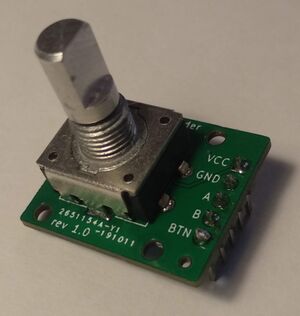Difference between revisions of "STM32 Rotary Encoder"
Jump to navigation
Jump to search
| Line 1: | Line 1: | ||
| − | [[Category:STM32]][[Category:STM32 Development]][[Category:STM32 HAL]]{metadesc|How to handle rotary encoders using STM32 HAL}} | + | [[Category:STM32]][[Category:STM32 Development]][[Category:STM32 HAL]]{{metadesc|How to handle rotary encoders using STM32 HAL}} |
[[File:Rotary Encoder w. debounce circuitry.jpg|thumb]] | [[File:Rotary Encoder w. debounce circuitry.jpg|thumb]] | ||
Rotary Encoders are devices which will generate pulses when they are turned. | Rotary Encoders are devices which will generate pulses when they are turned. | ||
Typically they will have two outputs with the pulses out of phase. By checking which pulse "comes first" the direction of the turn can be determined. It is not overly complicated to handle this manually, for example by hooking the signals up to an external GPIO Interrupt. | Typically they will have two outputs with the pulses out of phase. By checking which pulse "comes first" the direction of the turn can be determined. It is not overly complicated to handle this manually, for example by hooking the signals up to an external GPIO Interrupt. | ||
Revision as of 05:10, 26 July 2021
Rotary Encoders are devices which will generate pulses when they are turned.
Typically they will have two outputs with the pulses out of phase. By checking which pulse "comes first" the direction of the turn can be determined. It is not overly complicated to handle this manually, for example by hooking the signals up to an external GPIO Interrupt.
